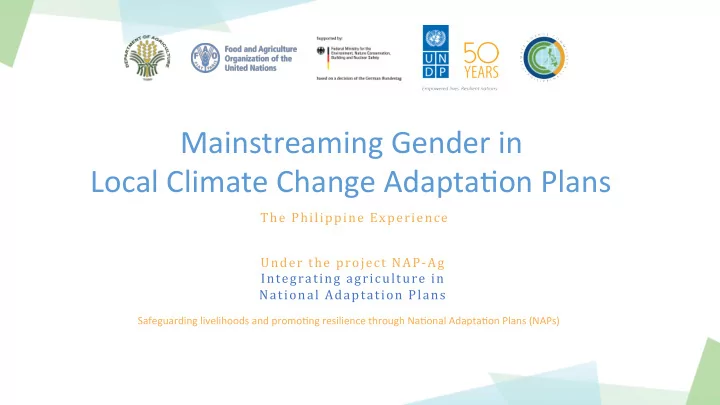

Mainstreaming Gender in Local Climate Change Adapta3on Plans The Philippine Experience Under the project NAP-Ag Integrating agriculture in National Adaptation Plans Safeguarding livelihoods and promo3ng resilience through Na3onal Adapta3on Plans (NAPs)
• The agriculture sector contributes ~ 12% of the country’s Climate change GDP and employs 32% (11 million) of the economically challenges in ac3ve popula3on. the agriculture • By 2050, climate change is es3mated to cost the sector Philippine economy approximately 500M USD per year. • The agriculture sector absorbed an average of 27% of the economic impacts from natural hazards from 1995-2013. • Due to its geographical loca3on, the Philippines is vulnerable to seasonal events, such as typhoons, cyclones, droughts, and floods. • Challenges are likely to be exacerbated by poten3al increases in mean temperature and reduc3on in rainfall.
Gender gap in • Numerous enabling policies to close the country’s the agriculture gender gap have been enacted yet gender dispari3es in the agriculture sector s3ll exist. sector in the • Women contribute 74% to unpaid care work. Philippines • There are ins3tu3onal prac3ces that exacerbate inequality - ie prac3ce of masterlis3ng • Compared to men, Filipino women have significantly less access to – irriga3on, fer3lizers, seeds and other agricultural inputs, credit or financial assistance.
Gender gap in • ¾ of employed persons in agriculture, hun3ng, the agriculture forestry and fishing are men, ¼ are women however sector in the this does not account for unpaid work. Philippines • Women are less likely to be targeted for extension services, as many extension agents s3ll do not recognize women as agricultural producers. • Men are o_en excluded from discussions and efforts that address food security and nutri3on. While women are o_en excluded in DRRM planning.
• Gaps in the knowledge and capaci3es of Challenges in designated Gender Focal Points, especially mainstreaming among providers of agricultural research, gender in NAP training and extension services. • Knowledge is uneven even across mid-level government officials. • Gaps in knowledge of farmers on climate change adapta3on and mi3ga3on. • Farmers from the regions most affected by climate change were more aware of CC concepts but lack understanding of mi3ga3on strategies. • Farmers least affected by climate change only have surface understanding of the concepts.
Challenges in • Lack of synergy between na3onal level mainstreaming planning and local level planning. gender in NAP • Na3onal Climate Change Ac3on Plan (NCCAP) spearheaded by the Climate Change Commission which is very central. • Agriculture and Fisheries Moderniza3on Plan (AFMP) is spearheaded by the Department of Agriculture (DA) which has regional offices. • The Philippines has opted not to develop a separate Na3onal Adapta3on Plan (NAP) but will be integra3ng the NAP process in the NCCAP upda3ng.
• DA is suppor3ve in pursuing localized Opportunities in adapta3on plans. mainstreaming • Local climate change ac3on plans (LCCAP) are gender in NAP more flexible. • Regional agricultural offices are more recep3ve. • Local agricultural offices have separate budget for capacity building. • 5% local budget mandated for gender-related projects. • The rela3onship between local agriculture office and local government is more synergis3c. • Openness to innova3on – NAP-Ag team and partners.
• Actual exis3ng LCCAPs were enhanced. Capacity • Only actors with direct impact and knowledge building of local of LCCAP were trained – DA regional directors, actors fisheries officers, gender and/or agri focal at the local government, and representa3ves from the farmers’ coopera3ves. • In3mate workshop– 15 pax max • At the end of the 3-day coaching, the par3cipants would have iden3fied 3 priority areas in the LCCAP, conducted gender analysis on the 3 priority areas and iden3fied gender- responsive indicators.
• Intersec3onality of climate change and Workshop gender. topics • Harnessing the demographic dividend and its impact on climate change. • The economic growth poten3al that can result from shi_s in a popula3on’s age structure (UNFPA) • Conduc3ng a rapid gender analysis. • Formula3ng gender responsive indicators.
• The iden3fied LCCAP priority areas per Lessons province greatly varies. Learned • Issues were raised at the local level which were not addressed in the na3onal plans • Climate informa3on does not arrive in a 3mely manner. • Lack of transport link from farm to market. • Women tend to be less integrated in value chains than men. • Low acceptance of products from indigenous communi3es. • Need for market research for value adding products. • Lack of savings. Mul3ple debts from informal sources. • Prevalence of teenage pregnancy among farmer families. • Lack of access to contracep3ves.
• Enhance the coherence and synergies Way Forward among different plans – NCCAP, AFMP, Philippine Development Plan, etc. • Include local actors in the na3onal consulta3on process for the upda3ng of the plans. • Increase technical assistance to local governments to access funding for LCCAPs.
For questions, you may contact: Thea Arcella Bohol Gender Mainstreaming Specialist Food and Agriculture Organization (FAO) of the United Nations TheaArcellaBohol@gmail.com
Recommend
More recommend